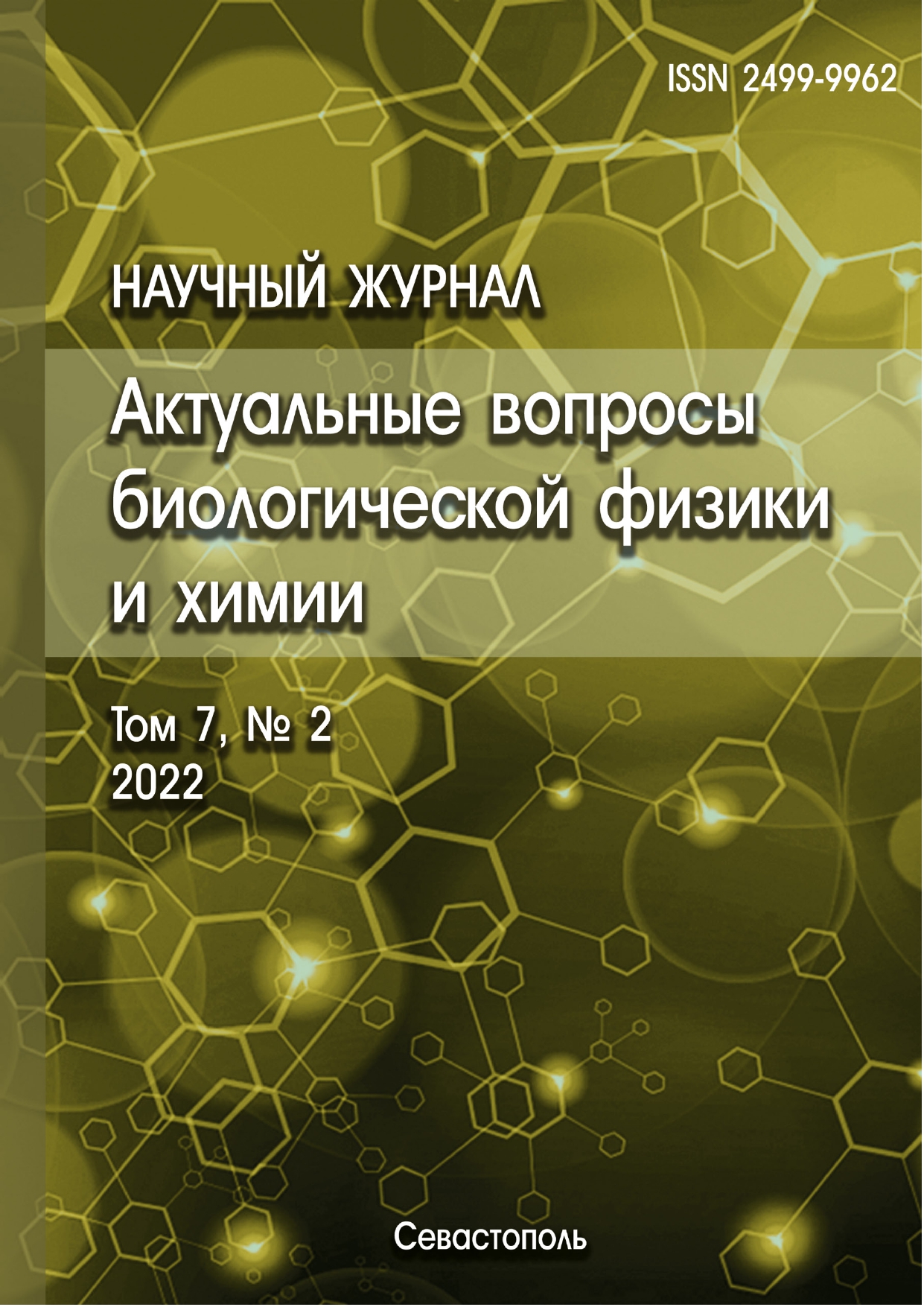Ереван, Армения
Ереван, Армения
Ереван, Армения
Ереван, Армения
Исследовано взаимодействие красителя-интеркалятора метиленового синего (МС) с одноцепочечными (оц-) poly(rA), poly(rU) и двухцепочечным poly(rA)-poly(rU) полинуклеотидами методами абсорбционной спектроскопии, при различных концентрационных соотношениях лиганд/фосфат (концентрация оц-полинуклеотидов по фосфатному остатку). Обнаружено, что в полосе поглощения метиленового синего, в интервале изменения длины волны 500≤λ≤750 нм спектры поглощения комплексов МС-оц-poly(rA) резко уменьшаются, по сравнению со спектром МС, по мере возрастания концентрации полинуклеотида в растворе. Также обнаружено, что спектры поглощения комплексов МС-оц-poly(rU) уменьшаются умеренно, при увеличении концентрации этого полинуклеотида в растворе. На спектрах комплексов МС-оц-poly(rU) образуется псевдоизобестическая точка, в то время как на спектрах комплексов МС-оц-poly(rA) такая точка не образуется. Псевдоизобестическая точка образуется и на спектрах комплексов МС-poly(rA)-poly(rU). Также обнаружено, что спектры поглощения комплексов МС с оц-poly(rA) и poly(rA)-poly(rU) сдвигаются в сторону длинных волн на ~5-7 нм, в то время как сдвиг спектров поглощения комплексов МС-оц-poly(rU) составляет всего ~2 нм. Изменения спектров поглощения комплексов МС с указанными полинуклеотидами, указывают на то, что МС проявляет высокую специфичность к poly(rA), по сравнению с poly(rU) и poly(rA)-poly(rU). Полученные данные также указывают на то, что МС с poly(rA) и poly(rA)-poly(rU) связывается интеркаляционным и электростатическим, а с оц-poly(rU) – в основном электростатическим механизмами.
метиленовый синий, полуинтеркаляционный механизм, poly(rA), poly(rU), poly(rA)-poly(rU) электростатическое связывание, спектры поглощения
1. Kankia B.I. Мг2+-induced triplex formation of an equimolar mixture of poly(rA) and poly(rU). Nucl. Acids Res., 2003, vol. 31, no. 17, doi:https://doi.org/10.1093/nar/gkg698. EDN: https://elibrary.ru/XRNHUE
2. Andrushchenko V., Blagoi Yu., van de Sande J.H., Wieser H. Poly(rA)•Poly(rU) with Ni2+ Ions at Different Temperatures: Infrared Absorption and Vibrational Circular Dichroism Spectroscopy. J. of Biomol. Struct. & Dyn., 2002, vol. 19, no. 5, doi:https://doi.org/10.1080/07391102.2002.10506792.
3. Vardevanyan P.O., Antonyan A.P., Parsadanyan M.A., Shahinyan M.A. Study of the influence of the ionic strength on complex-formation of ethidium bromide with poly(rA)-poly(rU). J. of Biomol. Struct. & Dyn., 2020, vol. 38, no. 8, doi:https://doi.org/10.1080/07391102.2019.1630006.
4. Dower K., Kuperwasser N., Merrikh H., Rosbash M. A synthetic A tail rescues yeast nuclear accumulation of a ribozyme-terminated transcript. RNA, 2004, vol. 10, doi:https://doi.org/10.1261/rna.7166704.
5. Svitkin Y.V., Sonenberg N. An efficient system for cap- and poly(A)- dependent translation in vitro. Meth. Mol. Biol., 2004, vol. 257, doi:https://doi.org/10.1385/1-59259-750-5:155.
6. Alvarez E., Castello A., Menendez-Arias L., Carrasco L. HIV protease cleaves poly(A)-binding protein. Biochem J., 2006, vol. 396, doi:https://doi.org/10.1042/BJ20060108.
7. Pradhan A.B., Haque L., Das S. Binding of Phenazinium Dye Safranin T to Polyriboadenylic Acid: Spectroscopic and Thermodynamic Study. PLOS ONE, 2014, vol. 9, no. 2, doi:https://doi.org/10.1371/journal.pone.0087992. EDN: https://elibrary.ru/YEDSGT
8. Tian B., Hu J., Zhang H., Lutz C.S. A large-scale analysis of mRNA polyadenylation of human and mouse genes. Nucleic Acids Res., 2005, vol. 33, 201-212. DOI:https://doi.org/10.1093/nar/gki158 EDN: https://elibrary.ru/XOOIAF
9. Bojadzic D., Alcazar O., Buchwald P. Methylene Blue Inhibits the SARS-CoV-2 Spike-ACE2 Protein-Protein Interaction-a Mechanism that can Contribute to its Antiviral Activity Against COVID-19. Front. Pharmacol., 2021, doi:https://doi.org/10.3389/fphar.2020.600372.
10. Bistas E., Sanghavi D. Methylene blue. (Treasure Island, FL: StatPearls), 2020.
11. Dicko A., Roh M.E., Diawara H., Mahamar A., Soumare H.M., Lanke K. et al. Efficacy and safety of primaquine and methylene blue for prevention of Plasmodium falciparum transmission in Mali: a phase 2, single-blind, randomised controlled trial. Lancet Infect. Dis., 2018, vol. 18, no. 6, doi: 10.1016/ s1473-3099(18)30044-6.
12. Cagno V., Medaglia C., Cerny A., Cerny T., Tapparel C., Cerny E. Methylene blue has a potent antiviral activity against SARS-CoV-2 in the absence of UV-activation in vitro, 2020.
13. Gendrot M., Andreani J., Duflot I., Boxberger M., Bideau M.L., Mosnier J., Jardot P., Fonta I., Rolland C., Bogreau H., Hutter S., La Scola B., Pradines B. Methylene blue inhibits replication of SARS-CoV-2 in vitro. Int. J. Antimicrob. Agents., 2020, vol. 56, doi:https://doi.org/10.1016/j.ijantimicag.2020.106202. EDN: https://elibrary.ru/NGYYSX
14. Vardhana S.A., Wolchok J.D. The many faces of the anti-COVID immune response. J. Exp. Med., 2020, vol. 217, no. 6, doi:https://doi.org/10.1084/jem.20200678.
15. Di Cosimo S., Malfettone A., Perez-Garcia J.M., Llombart-Cussac A., Miceli R., Curigliano G., Cortes J. Immune checkpoint inhibitors: a physiologydriven approach to the treatment of coronavirus disease 2019. Eur. J. Canc., 2020, vol. 135, doi:https://doi.org/10.1016/j.ejca.2020.05.026.
16. Liu P.P., Blet A., Smyth D., Li H. The science underlying COVID-19: implications for the cardiovascular system. Circulation., 2020, vol. 142, doi:https://doi.org/10.1161/CIRCULATIONAHA.120.047549. EDN: https://elibrary.ru/WUZTTP
17. Ye Q., Wang B., Mao J. The pathogenesis and treatment of the ‘cytokine storm’ in COVID-19. J. Infect., 2020, vol. 80, no. 6, doi:https://doi.org/10.1016/j.jinf. 2020.03.037.
18. Acharya V.V., Chaudhuri (Chattopadhyay) P. Modalities of Protein Denaturation and Nature of Denaturants. Int. J. Pharm. Sci. Rev. Res., 2021, vol. 69, no. 2, doi:https://doi.org/10.47583/ijpsrr.2021.v69i02.002.
19. Nedu M.-E., Tertis M., Cristea C., Georgescu A.V. Comparative Study Regarding the Properties of Methylene Blue and Proflavine and Their Optimal Concentrations for In Vitro and In Vivo Applications. Diagnostics, 2020, vol. 10, doi:https://doi.org/10.3390/diagnostics10040223.
20. Sani N.D.Md., Ariffin E.Y., Sheryn W., Shamsuddin M.A., Heng L.Y., Latip J., Hasbullah S.A., Hassan N.I. An Electrochemical DNA Biosensor for Carcinogenicity of Anticancer Compounds Based on Competition between Methylene Blue and Oligonucleotides. Sensors, 2019, vol. 19, doi:https://doi.org/10.3390/s19235111. EDN: https://elibrary.ru/DAEZKC
21. Vardevanyan P.O., Antonyan A.P., Parsadanyan M.A., Shahinyan M.A., Sahakyan V.G. Peculiarities of interaction of synthetic polyribonucleotide poly(rA)-poly(rU) with some intercalators. J. of Biomol. Struct. & Dyn., 2018, vol. 36, no. 14, doi:https://doi.org/10.1080/07391102.2017.1402708.
22. Vardevanyan P., Antonyan A., Parsadanyan M., Torosyan M., Karapetian A. Joint interaction of Ethidium Bromide and Methylene Blue with DNA. The effect of ionic strength on binding thermodynamic parameters. J. of Biomol. Struct. And Dyn., 2016, vol. 34, no. 7, doi:https://doi.org/10.1080/07391 102.2015.1079557. DOI: https://doi.org/10.1080/07391102.2015.1079557; EDN: https://elibrary.ru/WTPMMJ










